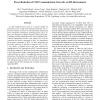Free Online Productivity Tools
i2Speak
i2Symbol
i2OCR
iTex2Img
iWeb2Print
iWeb2Shot
i2Type
iPdf2Split
iPdf2Merge
i2Bopomofo
i2Arabic
i2Style
i2Image
i2PDF
iLatex2Rtf
Sci2ools
105
click to vote
MICRO
2008
IEEE
2008
IEEE
Power reduction of CMP communication networks via RF-interconnects
As chip multiprocessors scale to a greater number of processing cores, on-chip interconnection networks will experience dramatic increases in both bandwidth demand and power dissipation. Fortunately, promising gains can be realized via integration of Radio Frequency Interconnect (RFI) through on-chip transmission lines with traditional interconnects implemented with RC wires. While prior work has considered the latency advantage of RF-I, we demonstrate three further advantages of RF-I: (1) RF-I bandwidth can be flexibly allocated to provide an adaptive NoC, (2) RFI can enable a dramatic power and area reduction by simplification of NoC topology, and (3) RF-I provides natural and efficient support for multicast. In this paper, we propose a novel interconnect design, exploiting dynamic RF-I bandwidth allocation to realize a reconfigurable network-on-chip architecture. We find that our adaptive RF-I architecture on top of a mesh with 4B links can even outperform the baseline with 16...
Hardware | MICRO 2008 | On-chip Interconnection Networks | On-chip Transmission Lines | RF-I Bandwidth |
Related Content
| Added | 31 May 2010 |
| Updated | 31 May 2010 |
| Type | Conference |
| Year | 2008 |
| Where | MICRO |
| Authors | M.-C. Frank Chang, Jason Cong, Adam Kaplan, Chunyue Liu, Mishali Naik, Jagannath Premkumar, Glenn Reinman, Eran Socher, Sai-Wang Tam |
Comments (0)

